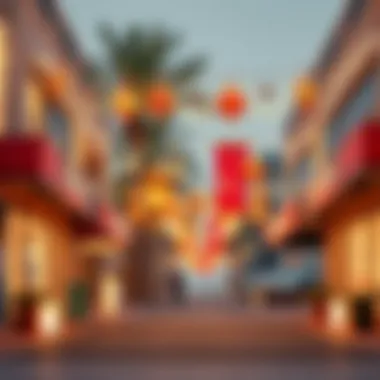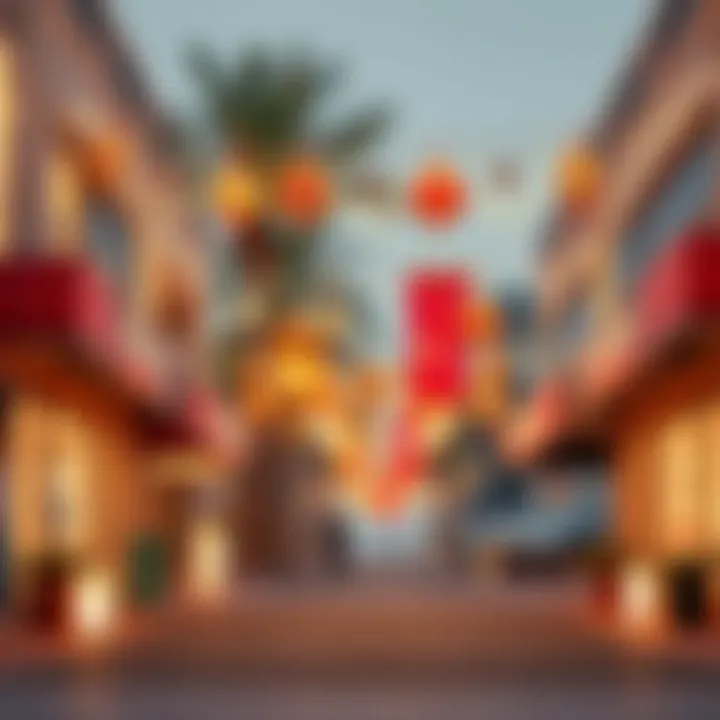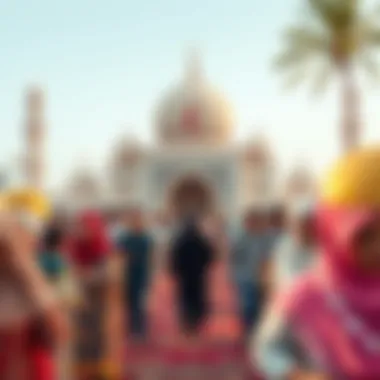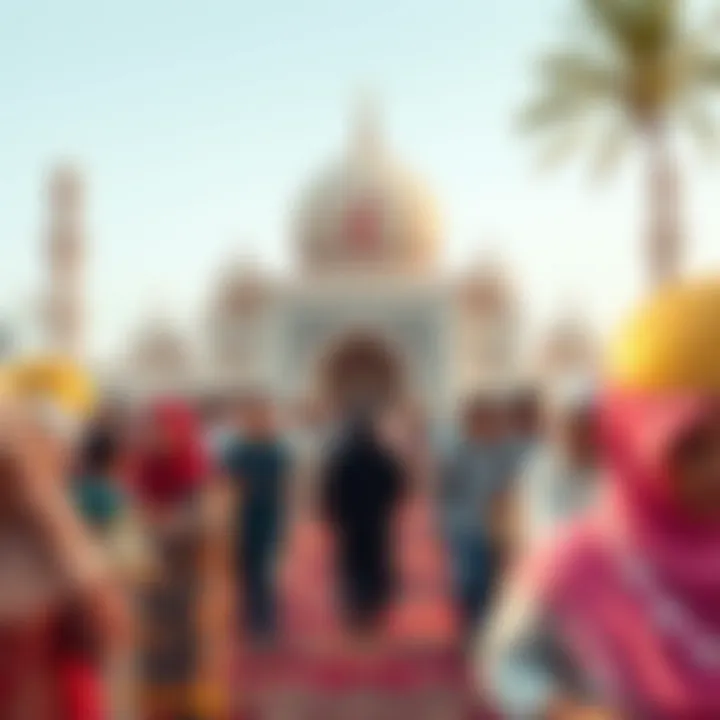Eid ul Fitr 2023 Celebrations in the UAE


Intro
Eid ul Fitr marks the end of Ramadan, a month of fasting and spiritual reflection for Muslims around the globe. In the UAE, this occasion is celebrated with vibrant festivities that bring together communities while showcasing the cultural depth and significance of the holiday. The year 2023 sees this celebration taking on a more profound role in the UAE, influencing the social fabric, economic landscape, and particularly the real estate market as both residents and expatriates partake in the holiday.
As families come together to share meals and exchange gifts, the investments in public events and decorations highlight the importance of community in this festive season. The public observances, including fireworks and cultural events, create an ambiance of joy and festivity. However, there’s more to Eid ul Fitr than just celebrations; it plays an essential role in shaping local economy dynamics and the real estate market, providing opportunities for investors, residents, and expatriates alike. In this deep dive, we explore how the holiday influences various sectors, with a keen focus on real estate in Dubai and throughout the UAE.
Understanding Eid ul Fitr
Eid ul Fitr stands as a pinnacle celebration within the Islamic faith, marking the end of Ramadan, a month devoted to fasting, prayer, and reflection. Understanding this holiday goes beyond recognizing it as a simple communal festivity; it's about grasping the profound layers of cultural and religious significance intertwined with its observance, particularly in places like the United Arab Emirates. This understanding is not only vital for Muslims but also for expatriates and visitors, offering insights into the rich tapestry of traditions that shape the social landscape of the UAE.
Historical Background
Eid ul Fitr, literally meaning "Festival of Breaking the Fast," has its roots deeply embedded in the historical and spiritual journey of Islam. It is believed that the inaugural Eid was celebrated by the Prophet Muhammad after he migrated to Medina. The Prophet Muhammad received a revelation that established the timing and significance of this day, which occurs on the first day of Shawwal, marking the month following Ramadan.
After an entire month of fasting and self-discipline, the first Eid ul Fitr underscored not only the joy of feasting but the importance of community, reflection, and charity.
In the UAE, the historical significance is embodied in communal prayers held in masjids across cities, with the largest congregations gathering at places like Sheikh Zayed Grand Mosque in Abu Dhabi. The essence of Eid came alive over the years as locals and expatriates alike fostered an environment of understanding, cooperation, and cultural exchange, where traditional practices melded with more modern adaptations.
Religious Significance
Religiously, Eid ul Fitr serves as a reminder of gratitude, as declared in Islamic teachings. The completion of fasting during Ramadan is not merely a physical feat; it encapsulates spiritual growth, a reinforcement of faith, and a reaffirmation of surrender to God. Muslims believe that the fast during Ramadan purifies the soul, and Eid marks the celebration of this spiritual renewal.
One of the crucial religious aspects is the Zakat al-Fitr, a form of charity given to the needy before the Eid prayer. This act emphasizes the purification of wealth and the responsibility of the more fortunate to assist those less fortunate. On this day, Muslims worldwide partake in communal prayers, heartfelt greetings, and shared meals, reinforcing communal bonds.
The teachings of Muhammad resonate during Eid ul Fitr, promoting values such as charity, compassion, and unity. With an emphasis on celebrating together, the importance of family ties and community relationships is highlighted through various observances during this festive period.
Eid ul Fitr not only marks the end of a challenging month but also serves to instill feelings of joy, gratitude, and a sense of togetherness, echoing through celebrations in vibrant streets and homes throughout the UAE.
Eid ul Fitr 2023: Dates and Timing
Eid ul Fitr, marking the end of Ramadan, holds immense importance in the UAE. The dates and timing of this festival not only symbolize the completion of a significant month of fasting but also influence many aspects of daily life. From scheduling community events to setting public holidays, the days around Eid are meticulously observed, bringing both tradition and modernity into play. Understanding the dates is critical for everyone, especially expatriates and investors, who may need to adjust their plans around this festive period.
Announcement of Eid
The announcement of Eid is an event wrapped in anticipation. Each year, the exact date of Eid ul Fitr is determined by the sighting of the moon, which is why it varies from year to year. This year, in 2023, the expected date of Eid is around April 21st, depending on lunar visibility.
In the UAE, this announcement is made by the Moon Sighting Committee, a group tasked with observing the moon. Their declaration is covered extensively in the media, providing the public with updates so they can partake in the festivities. For expatriates and visitors, knowing the date helps in planning their celebrations and understanding local customs. Additionally, social media platforms like Facebook often host discussions about the announcement and subsequent festivities, creating a buzz and excitement.
"Eid is not just a celebration; it is a time for coming together and creating lasting memories among families and friends."
The way the announcement is made signifies the cultural unity in the UAE. This harmonious approach ensures that everyone, regardless of nationality, can celebrate Eid in the spirit of community.
Public Holidays Schedule
With Eid being recognized as a public holiday, the UAE government typically announces an extended holiday period. In 2023, residents can expect at least three days of public holidays, starting from the official announcement of Eid. This is a time when the hustle and bustle of daily life slows down, and families gather.
During these days, many workplaces close, allowing employees to fully engage in religious observances and festive activities.
This extended break is beneficial for several reasons:


- Travel: It provides the opportunity for family visits, both locally and abroad.
- Shopping: Local businesses often hold special promotions leading up to Eid, attracting shoppers looking for gifts and food supplies.
- Community Events: Many cities host local events, including fireworks and community feasts, enhancing the festive atmosphere.
Understanding this public holiday schedule is crucial for investors as well. Planning meetings or business activities around these dates is advisable since many people will likely be off work. This time can serve as a unique opportunity for businesses in the hospitality sector, as tourists flock to the UAE for celebrations.
In summary, the dates and timing for Eid ul Fitr 2023 in the UAE are not merely about the festivities. They are a reflection of community, cultural significance, and heightened economic activities, all intertwined to create a rich tapestry of experience during this holy period.
Cultural Practices During Eid
Cultural practices during Eid ul Fitr are integral to understanding the holiday's essence in the United Arab Emirates. These practices intertwine age-old traditions with modern interpretations and social customs that reflect the diverse society of the UAE. As the holiday concludes the holy month of Ramadan, it becomes a vibrant canvas where families and friends come together to celebrate unity, gratitude, and generosity.
The importance of cultural practices during Eid cannot be overstated. They serve not only as a means of celebration but also as an avenue to strengthen community bonds and to preserve cultural identity amidst a rapidly evolving environment. Participation in these practices can vary significantly among individuals and families, influenced by regional customs, family traditions, and even personal beliefs. For investors, expatriates, and residents in the UAE, understanding these practices provides a unique perspective on social interactions and festivities that may affect business and community opportunities.
Traditional Celebrations
When discussing traditional celebrations, one of the cornerstones is the Eid prayer, held early in the morning on Eid day in mosques and open fields. This solemn yet uplifting gathering is where congregants don their finest attire, often adorned in new clothing to symbolize fresh beginnings. The air brims with the scent of traditional sweets, as people greet each other with warm wishes of "Eid Mubarak"—blessings for a joyous Eid.
Families visit the graves of loved ones, paying respects and offering prayers, which fosters a sense of continuity and remembrance. It's a poignant reminder of the transient nature of life. After prayers, the communal aspect blooms; families come together for elaborate feasts that include dishes reflective of regional cuisines, such as biryani, kebabs, and sweet delights like baklava. Sharing meals during Eid creates a sense of fellowship and goodwill, extending to neighbors and less fortunate members of the community.
- Gift-giving, or "Eidi," plays a significant role during this time, especially for children. The act of gifting reinforces affection and is a means of expressing gratitude for wealth and health.
- People also express their deep-rooted belief in charity by giving Zakat al-Fitr, a form of obligatory charity meant to purify the fasts and provide for those in need.
Modern Adaptations
While traditional customs remain strong, modern adaptations have influenced how Eid is celebrated, especially in the cosmopolitan context of the UAE. With a significant expatriate population, colors and flavors from various cultures amalgamate, creating a unique multicultural atmosphere.
Social media platforms like Facebook and Instagram have become avenues through which families share their celebrations, connecting with loved ones both near and far. This virtual interaction, though relatively new, brings together a sense of global community.
In urban hubs like Dubai, events such as fireworks displays, cultural exhibitions, and pop-up markets now fill the festive air, welcoming residents and tourists alike. These events not only celebrate Eid but also augment the local economy by promoting tourism and local crafts.
Moreover, many families now integrate technology into their celebrations. Virtual iftar gatherings during Ramadan evolve into online Eid celebrations, bridging the gap between those who can’t physically be present. This blend of tradition and technology adds a modern twist to age-old festivities, broadening the understanding of togetherness that Eid embodies.
As cultural practices evolve, they reflect an overall commitment to inclusion and respect for diverse backgrounds, making Eid a truly global celebration.
“In the UAE, Eid ul Fitr celebrates more than just the end of a fast; it embodies a rich tapestry of cultures weaving through tradition and modernity.”
As investors and residents embark upon the holiday season, understanding these practices not only clarifies the significance of the celebrations but also enhances the experience of those living in or visiting the area.
Eid ul Fitr Traditions in the UAE
Eid ul Fitr is not just a significant religious event in the UAE; it is a grand celebration that embodies the very essence of community, charity, and tradition. This festive season is marked by a series of customs and practices that reflect the rich cultural tapestry of the nation. Understanding these traditions provides valuable insights into the social fabric of the UAE, especially for investors, expatriates, and residents who seek to engage with the local culture during this vibrant time of year.
Community Gatherings
One of the most charming aspects of Eid ul Fitr in the UAE is the emphasis on community gatherings. Families and friends reunite to celebrate the end of Ramadan, fostering a sense of belonging and togetherness. From backyard barbecues to large communal feasts, these gatherings often take on a festive flair that showcases the local culture's hospitable nature.
In many neighborhoods, it’s tradition for people to host open houses where guests drop by, often unannounced, to share in the joy. This informal get-together promotes a spirit of camaraderie among residents and is a fantastic opportunity for expatriates to immerse themselves in Emirati culture. These community interactions play a vital role in reinforcing ties among different nationalities settled in the UAE.
Charity and Zakat


Charity is at the heart of Eid ul Fitr celebrations. The act of giving, specifically through Zakat al-Fitr, holds deep religious significance in the Islamic faith. Every family ensures that they provide a charitable contribution before the Eid prayer, which serves the dual purpose of purifying their fast and helping the less fortunate celebrate Eid joyously.
This outpouring of generosity is not limited to financial contributions; food drives and community service become core activities during this time. Families often prepare packages containing essentials, which are distributed to those in need. For investors or landlords in Dubai and other emirates, participating in or sponsoring these charitable initiatives can significantly enhance their communal standing.
Food and Festivity
No Eid celebration is complete without an array of sumptuous dishes. The culinary aspect of Eid ul Fitr holds a special place in the festivities, as families prepare a feast that highlights traditional Emirati flavors. Meals often feature dishes like Al Harees, a slow-cooked dish made of wheat and meat, or Machboos, a spiced rice dish.
The act of sharing these dishes with neighbors and friends reinforces social bonds and cultural exchange. Besides the local delicacies, various international cuisines also make their way to the Eid table, thanks to the multicultural presence in the UAE. This aspect is a clear reflection of the country's openness and hospitality toward different cultures.
Moreover, the after-meal festivities often include visits to parks, shopping centers, and other attractions. Fireworks light up the skies in major cities like Dubai and Abu Dhabi, signaling the celebratory spirit of the season.
Impact of Eid on Dubai's Economy
The economic landscape of Dubai experiences a significant transformation during the Eid ul Fitr holiday. This period not only celebrates the end of Ramadan but also ushers in a wave of economic activities, impacting diverse sectors. Retail, hospitality, tourism, and even real estate see a promising surge in activities driven by increased consumer spending and a festive atmosphere. Understanding this impact is crucial for investors, expatriates, and even local businesses aiming to harness the upbeat vibe of Eid.
Retail and Hospitality Sector Growth
In the lead-up to Eid, retail businesses often prepare to welcome a flood of shoppers eager to purchase gifts, clothing, and specialty items. Malls such as The Dubai Mall and Mall of the Emirates see bustling foot traffic, as families look to take advantage of holiday promotions and discounts. According to data from the Dubai Economic Department, spending can rise by up to 30% in the retail sector around this time.
- Gifting Trends: Gifts such as new clothes, electronics, and gourmet treats are common purchases. Unique local products from Emirati craftsmen also gain favor among consumers seeking to blend tradition with modernity.
- Hospitality Buzz: Hotels and restaurants roll out special Eid menus and promotions to lure families and tourists. The dining scene during Eid becomes vibrant as people gather to celebrate, boosting hotel occupancy rates to near full capacity.
As the night lights twinkle across the skyline, the atmosphere transforms into a lively celebration, with restaurants often fully booked days in advance, creating a robust economic ripple effect throughout the city.
Tourism Boost
Eid ul Fitr serves as a magnet for tourists, drawing visitors from different parts of the world to experience the unique cultural celebrations that the UAE has to offer. Airlines and hotels often report a spike in bookings during this festive time.
- Cultural Tourism: Tourists visiting Dubai during Eid can participate in traditional celebrations, including nightly fireworks, festivals, and markets showcasing local arts. This not only enhances the city’s cultural richness but also provides a substantial economic boost.
- Economic Indicators: The influx of tourists contributes to the broader hospitality sector, with hotels seeing a significant uptick in room bookings. Some reports indicate that hotel occupancy rates can jump by 20% or more due to the added allure of the Eid festivities.
"The financial pulse of Dubai often beats faster during Eid, marking a season where cultural celebration meets economic opportunity."
Participating in these festivities not only enriches the visitors' experience but also contributes robustly to the local economy. The positive effects ripple through service industries, from transport to entertainment, ensuring that Eid ul Fitr is not just a religious holiday, but a vital economic period for Dubai.
Real Estate Market Trends During Eid
The period of Eid ul Fitr in the UAE holds significant sway over many facets of life, particularly in the real estate sector. As families and tourists flock to the region during this time, businesses and investors align their strategies to capitalize on the festive spirit. Eid is not just a time for celebration, but it also shapes market dynamics in a way that is worthy of exploration.
Increased Demand for Short-Term Rentals
During Eid, the demand for short-term rentals sees a notable spike. More and more families, expatriates, and tourists look for temporary accommodations, seeking out comfortable spaces to enjoy the festivities. This surge in interest can often put pressure on the rental market, as options become limited.
- Holiday Packages: Many landlords and property management companies recognize this tendency. They often package their offerings around Eid, creating attractive bundles that include amenities for families, such as nearby attractions and seasonal tours.
- Flexibility in Rentals: Short-term rentals are usually less restricted than long-term leases. This flexibility is appealing, giving visitors the option to stay for a few days without committing to a lengthy lease agreement.
As a result, property owners might increase rental prices in response to heightened demand, especially in sought-after areas like Dubai Marina and Downtown Dubai. Potential investors may find it prudent to assess short-term rental strategies during this festive season.
Impact on Property Values


The economic Ripple effects of Eid reach into property values as well. When the demand for short-term rentals climbs, it might influence longer-term property prices as well. Here's how this seasonal fluctuation plays out in the market:
- Comparative Market Analysis: Seasonal events like Eid invite rigorous real estate analysis. Property values may see an uptick as a desire for premium living spaces increases. With rising demand, these areas become more attractive, effectively raising their value.
- Market Confidence: Investors might also perceive Eid as a bellwether of the local economy's health. Increased visitor numbers suggest robust economic growth, encouraging real estate investment.
- Gentrification Factors: Depending on desired areas, this can lead to gentrification. Premium developments might arise in historically under-valued markets, shifting property values significantly.
"The real estate market doesn't simply react; it tells a story of demand and economic viability. Eid is a prime chapter in this narrative."
As property prices fluctuate, both buyers and sellers must stay informed and adapt. Investors, particularly in the UAE, can benefit from closely monitoring these trends during Eid, ensuring they are positioned to make informed decisions. In essence, the interplay between traditional celebrations and real market strategies forms a unique landscape where opportunity meets cultural significance.
Navigating the Real Estate Landscape During Eid
During Eid ul Fitr, the vibrancy of festive celebrations reverberates throughout the Emirati landscape, but it also introduces a unique layer to the real estate market. Understanding the dynamics at play during this period is essential for all who are engaged in buying, renting, or investing in properties. Eid plays an increasing role in shaping consumer behavior, and thus, it’s vital for homebuyers and investors alike to navigate this landscape adeptly.
One cannot overlook the surge in demand for housing during this festive period. With families coming together and expatriates returning to the UAE for celebrations, the rental market sees an uptick that often catches many off guard. This presents a set of opportunities and challenges for both renters and property owners. Amidst the festive cheer, understanding what’s happening in real estate becomes quite critical.
For homebuyers and renters, there are practical considerations that need attention. Potential buyers might find that Eid can actually provide leverage in negotiations. When there’s heightened activity, properties may linger on the market longer than anticipated, leading to opportunities for buyers willing to engage. And for renters, there’s commonly an influx of short-term rental options, which could offer unique experiences while also showcasing properties that are otherwise unavailable.
"Eid creates both demand and supply, making it a double-edged sword for those involved in real estate."
In this section, we will delve deeper into actionable insights for both home seekers and seasoned investors who aim to leverage Eid ul Fitr's influence on the real estate market.
Tips for Homebuyers and Renters
- Research Before Engaging: Knowledge of the local market is vital. Look into how Eid has affected previous years’ rental prices and demand in your desired area. Websites like propertyfinder.ae provide valuable historical pricing data that can help approach negotiations strategically.
- Be Flexible with Your Options: Understand that many landlords may increase rents during Eid due to high demand. Consider alternative locations or types of properties if initial listings exceed your budget.
- Leverage Short-Term Rentals: Explore platforms like Airbnb or Vrbo, where many property owners offer short-term leases tailored for those coming in for the holidays. It can be a cost-effective way to enjoy the festive period while searching for long-term housing.
- Timing is Key: The closer you get to Eid, the more hectic the market becomes. Start your search early so that you’re not stuck scrambling when the best properties are snapped up.
- Network with Locals: Engage with local communities or expatriate groups who might provide insider tips or leads on available properties during Eid. Platforms like Facebook have specialized groups dedicated to housing that could be beneficial.
Investors' Perspective
For investors, Eid ul Fitr signifies not just a celebration but a chance to reevaluate portfolios and explore new ventures. Here are a few insights for navigating the investment landscape:
- Understand Seasonal Trends: The holiday period often reflects a shuffling of residents and expatriates, so recognizing these patterns can aid in making informed investment decisions. Historically, post-Eid there is usually a slight stabilizing in demand, which can be a good entry point.
- Assess Improved Demand for Luxurious Rentals: With families keen on living closer to leisure and commercial hubs during Eid, investors can capitalize on short-term luxury rentals which tend to yield higher returns.
- Engage in Strategic Partnerships: Collaborate with property management firms that understand the peak seasons better. Their local knowledge can help you maximize profits while easing operational burdens.
- Market to High-Income Expatriates: Promote properties that appeal to expatriates returning home during Eid. Highlight amenities that cater specifically to their needs—swimming pools, gyms, and proximity to cultural hubs are often attractive.
- Explore New Developments: This can be an opportune time to invest in new housing developments as many buyers look for modern accommodations. Keep an eye on upcoming projects highlighted in local news or available on investment platforms.
Understanding the landscape during Eid ul Fitr is crucial in navigating the real estate waters effectively. It’s a blend of cultural appreciation and market awareness that can yield benefits if approached correctly.
Closure on Eid ul Fitr's Influence
Eid ul Fitr is not merely a celebration marking the end of Ramadan; it is a vivid tapestry woven with cultural significance, economic impact, and deep-rooted traditions. The holiday serves as a touchstone, providing insights into the values and relationships that shape communities in the UAE. It fosters a sense of belonging, not just for those who are born in the region but also for expatriates who find a home away from home. As we look at the essence of Eid ul Fitr in 2023, several elements stand out that resonate across various demographics, from families to investors.
Reflections on Cultural Importance
At the heart of Eid ul Fitr lies a spirit of unity and gratitude. Families gather to break their fast and share sumptuous meals, like sweet treats such as baklava and kheer. The act of giving, emphasized through charity, reminds everyone of the collective responsibility towards the less fortunate. The UAE's multicultural environment adds another layer of richness to the celebrations. For instance, expatriates from different backgrounds often blend traditional practices with local customs, creating a unique fusion of observances.
- Celebration of Diversity: Each community adds its flavor, resulting in a vibrant mix of food, music, and traditions that can be seen during public events. Local parks and malls become venues for grand festivities where different ethnic backgrounds come together to celebrate.
- Strengthening Ties: The rituals surrounding Eid ul Fitr—like visiting relatives and friends—foster relationships, and encourage dialogue and connection among diverse groups.
This cultural significance is further accentuated by community events and festivals organized during the holiday, reflecting the UAE's commitment to inclusivity and integration.
Future Trends to Consider
As we delve into the future, several trends are emerging that may shape the observance of Eid ul Fitr in the years to come. The interplay between tradition and modernity will likely continue to evolve. Investors, expatriates, and locals alike should be mindful of the following aspects:
- Evolving Celebrations: With technology becoming more integrated into daily life, many are turning to virtual gatherings and digital platforms for their celebrations. This could enhance reach but also risk compromising the intimate feel of traditional gatherings.
- Sustainable Practices:
- Real Estate Opportunities:
- Cultural Involvement: Organizations may focus on promoting the cultural festivities more broadly, which can boost local tourism and economic activity beyond just the immediate holiday.
- An increasing number of people are adopting sustainable practices during Eid, from using eco-friendly materials in decorations to donating excess food, reflecting global concerns over waste.
- Knowing this can influence businesses looking to engage with a conscientious consumer base.
- As demand for short-term rentals surges during the holiday, savvy investors may find opportunities to capitalize on accommodations catering to both tourists and returning residents.



